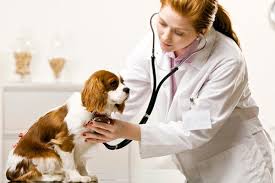Ph.D. in Animal and Veterinary Sciences: Introduction, Admission, Registration, Eligibility, Duration, Fees, Syllabus 2024

Introduction:
A Ph.D. in Animal and Veterinary Sciences stands at the forefront of advancing animal health, welfare, and veterinary medicine. This interdisciplinary program delves into various aspects of animal biology, behavior, nutrition, diseases, and management, with a focus on research-driven solutions to improve animal health outcomes. Graduates of this program are equipped with the knowledge, skills, and expertise to pursue careers in academia, research institutions, government agencies, and the private sector, making significant contributions to the well-being of animals and society.
Admission Process:
- Submit an online application through the university's admissions portal.
- Provide transcripts of undergraduate and any relevant graduate coursework.
- Letters of recommendation from professors or professionals familiar with the applicant's academic and research abilities.
- Statement of purpose outlining the applicant's research interests, academic background, and motivation for pursuing a Ph.D. in Animal and Veterinary Sciences.
- GRE scores may be required by some institutions.
- Interview with faculty members or admission committee.
Eligibility:
- A master's degree in veterinary science, animal science, biology, or a related field.
- Strong academic background with a minimum GPA requirement.
- Proficiency in English, often demonstrated through standardized tests like TOEFL or IELTS for international students.
- Research experience or relevant work experience may be preferred by some programs.
Completion Time:
The typical duration to complete a Ph.D. in Animal and Veterinary Sciences ranges from 4 to 6 years, depending on factors such as research progress, dissertation preparation, and program requirements.
Career Opportunities:
- University professor or lecturer in veterinary medicine, animal science, or related fields.
- Research scientist in academic institutions, government agencies, or private industries.
- Veterinary pathologist diagnosing and researching animal diseases.
- Veterinary clinician specializing in a particular species or discipline.
- Animal welfare specialist advocating for the ethical treatment of animals in various sectors.
Syllabus:
- Advanced Animal Physiology and Anatomy
- Veterinary Pharmacology and Therapeutics
- Animal Nutrition and Feed Technology
- Veterinary Epidemiology and Public Health
- Veterinary Pathology and Diagnostic Techniques
- Animal Behavior and Welfare
- Advanced Topics in Veterinary Medicine and Surgery
- Dissertation Research and Writing
Internship Opportunities:
- Clinical rotations in veterinary hospitals or clinics, gaining hands-on experience in diagnosis, treatment, and surgery.
- Research internships with academic institutions, government agencies, or industry partners, contributing to ongoing research projects.
- Internships with animal welfare organizations, gaining insights into advocacy, policy development, and animal care practices.
- Teaching assistantships within the veterinary or animal science department, assisting faculty with teaching and laboratory sessions.
- Opportunities for international internships or exchange programs, expanding horizons and cultural understanding.
Scholarships and Grants:
- Graduate assistantships providing stipends and tuition waivers.
- Institutional scholarships or fellowships based on academic merit.
- Research grants from government agencies such as the National Institutes of Health (NIH) or private foundations.
- Veterinary scholarships sponsored by professional organizations or industry partners.
- Travel grants to attend conferences, present research findings, or participate in scientific meetings.
FAQs:
What research areas are covered in a Ph.D. program in Animal and Veterinary Sciences?
Research areas may include animal diseases, pharmacology, nutrition, reproduction, behavior, genetics, epidemiology, surgery, and public health.
Are there opportunities for hands-on clinical experience during a Ph.D. program?
Yes, many Ph.D. programs offer clinical rotations or externships in veterinary hospitals or clinics, providing students with practical experience in veterinary medicine and surgery.
Can I pursue a Ph.D. in Animal and Veterinary Sciences without a veterinary degree?
While a veterinary degree is not always required, applicants without a veterinary background may need to demonstrate proficiency in relevant areas of animal science, biology, or related disciplines.
What are the prospects for postdoctoral positions after completing a Ph.D. in Animal and Veterinary Sciences?
Graduates can pursue postdoctoral research positions in academia, government agencies, or industry, furthering their research expertise and preparing for independent research careers.




